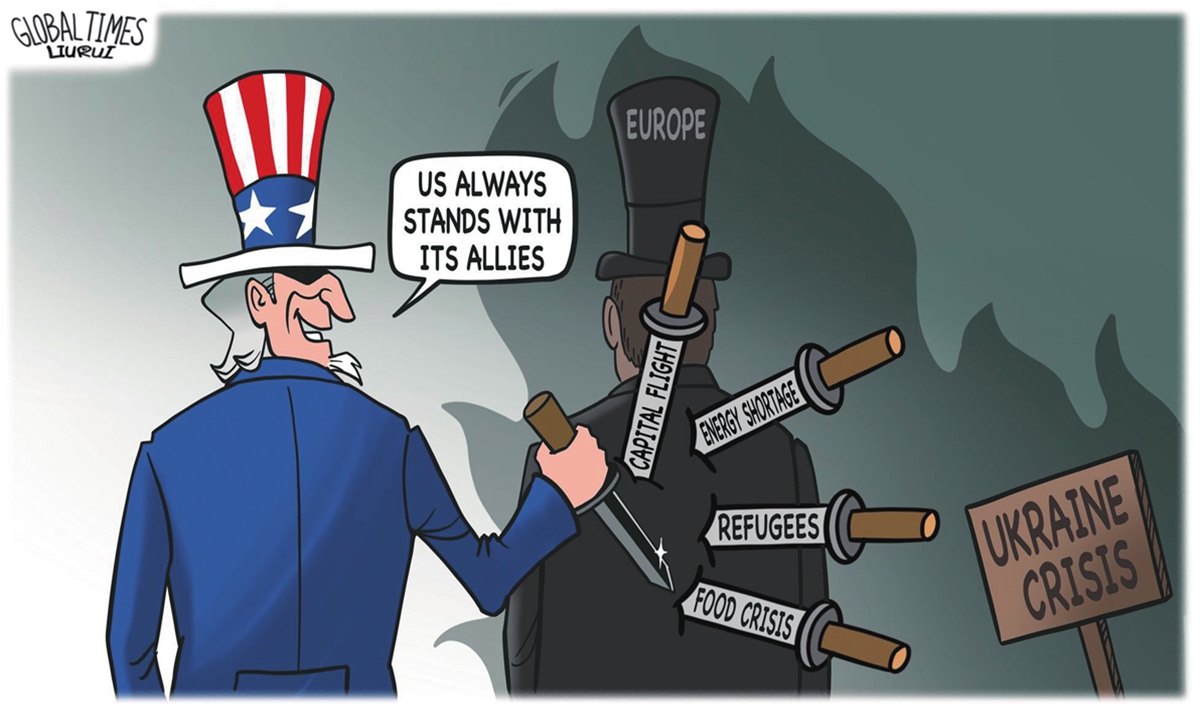When a friend in need becomes a friend in greed – How US stabs its European allies in the back

US Europe Illustration: Liu Rui/GT
When the Native Indians greeted Americans' forefathers with food and kindness, the latter reciprocated with guns and bullets. Times have changed but the tradition is passed on. The US has time and again proven to be a wily and untrustworthy "friend" for other nations.When French President Macron complained about the astronomical price that the EU had to pay to the US energy industry, he might recall that it was his American and British friends that hijacked the French nuclear-powered submarines contract with Australia only one year ago, which was denounced as "a stab in the back" by French Foreign Minister Jean-Yves Le Drian.
France is not the only victim among America's European partners. When it comes to America's tactics to contain its foes, and allies alike, the most preferred strategy is to stoke geopolitical conflict. History has demonstrated how perfectly this method works, from George Kennan's "long telegram" to the ongoing Ukraine crisis. For the US, the situation in Ukraine is actually a window of opportunity. The hot conflict has not only revitalized the old transatlantic military organization NATO, but also narrowed cooperation and business choices for Europe.
By encouraging Ukraine to "fight Russia till the last Ukrainian", the US generated huge orders for its military industrial complex. According to a report from the Hill in March, since the start of the new year, Lockheed Martin's stock had soared nearly 25 percent, while Raytheon, General Dynamics and Northrop Grumman each saw their stock prices rise by around 12 percent. As the conflict dragged on, the US also drastically increased its military presence in Europe. On June 29, the US Department of Defense confirmed that 20,000 additional forces had been deployed to Europe since the beginning of the conflict, ending a 30-year record of declining US force deployment in Europe. At the strategic level, the US has successfully resuscitated the "brain dead" NATO, and squashed the European dream of defense independence. Has the US really fulfilled its promise that it "never left its allies alone"? Let's not forget what happened to America's Afghan allies last year.
European countries now find themselves trapped in not just one predicament. They should be well reminded that America would never hesitate to secure its national interests at the cost of others, including its allies. This is usually well-hidden and camouflaged with catchphrases like "shared values" or "like-minded democracies", but the Trump administration boldly unveiled America's true intention by imposing tariffs on European steel and aluminum.
Now with deteriorating diplomatic relations with Russia, Europe has grown more dependent on American energy to muddle through the coming winter. The US has viewed Germany as a major "troublemaker" since Chancellor Angela Merkel started the Nord Stream 2 pipeline project with Russia. For years the US has been attempting to sabotage this project, coercing the Germans to quit. The outbreak of the Ukraine conflict finally made Germany and most of other European countries give up "authoritarian support" and turn to "democratic energy".
According to the International Energy Agency, the US supply of gas surpassed Russia in June. A US cargo sold in Europe could bring in a profit of $200 million. Laurent Segalen, an energy investment banker who hosts the Redefining Energy podcast, said that US companies can fill and send a ship across the Atlantic for some $60 million, then return with $275 million.
"That is not exactly the meaning of friendship," complained Macron, pointing out that European countries are paying four times more than the price the US sells domestically. Perhaps it is not about friendship in the first place. The US is asking European countries to pay for the extra "democratic values" attached to American gas.
While Europeans are struggling to fill up their gas tanks before winter, the Federal Reserve paced up its strong dollar policy amid global recession, raising interest rates by 75 basis points for the sixth time this year, its highest level since 2000. Thanks to the strong dollar, the Eurozone is really going to the wall. According to a Capital article, the EUR/USD exchange rate fell below the 99-cent mark, hitting a 20-year low. Dismissing the risks of a strong U.S. dollar, the American President blamed anemic growth and policy missteps in other parts of the world, including Europe, for dragging down the global economy. "Our economy is strong as hell", announced President Biden.
Ultimately, it's a European call to decide Europe's own future. Rather than relying on a "fatal friend", the EU should take serious steps for strategic autonomy and find a friend indeed rather than a friend in greed.
The author is a commentator on international affairs, writing regularly for Xinhua News Agency, Global Times, CGTN, China Daily etc. He can be reached at xinping604@gmail.com.



